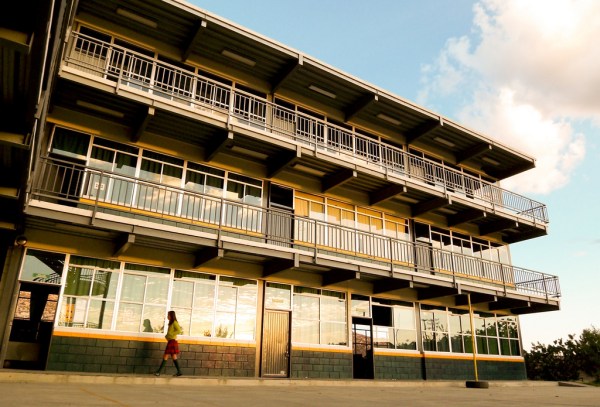By Raymundo Miguel Campos Vázquez, Luis-Felipe López-Calva, and Nora Lustig*

A student walks around Preparatoria Vasconcelos Tecate. / Gabriel Flores Romero / Flickr / Creative Commons
Mexico’s experience with free trade has challenged one of the tenets of faith economists know well from reading early in their careers David Ricardo’s Principles of Political Economy and Taxation: that “the pursuit of individual advantage is admirably connected with the universal good of the whole” and that “[trade] distributes labor most effectively and most economically.” Under this principle, “wine shall be made in France and Portugal; corn shall be grown in America and Poland; and hardware and other goods shall be manufactured in England.” Mexico reminds us that while these benefits exist in the abstract, there are trade-offs to be faced—that there are, potentially, social and individual costs induced by trade liberalization.
In a recently published paper entitled “Endogenous Skill Acquisition and Export Manufacturing in Mexico,” MIT economics professor David Atkin shows the ways in which individual people experience trade and how it affects their decision-making – sometimes in ways that may not necessarily be socially desirable. It analyzes a time period (1986-2000) during which Mexico underwent major economic transformations, including a rapid process of trade liberalization after 1989 and the introduction of the North American Free Trade Agreement (NAFTA) in 1994. Analyzing data for more than 2,300 municipalities in the country, the paper tells us that young Mexicans at the time faced a very basic decision: to stay in school and continue studying or to drop out and look for a job (among the many being created in the export-oriented manufacturing sector), most of which did not require more than a high school education. Atkin found that, on average, for every 25 new jobs created in the manufacturing sector, one student would drop out after 9th grade. (The World Development Report 2008 on Agriculture for Development had raised the question about “missing” individuals in this age group, but in relation to migration.)
- While trade brought positive effects including a higher demand for low skilled workers and an eventual increase in their wages – consistent with David Ricardo’s basic notion – Atkin concluded that in Mexico it had the socially undesirable effect of preventing, or slowing down, the accumulation of human capital. The reduction in human capital investment is a trade-off which can have negative effects on the economy as a whole.
- Factors other than free trade might explain this effect. First, young students may drop out if the returns to schooling are not high enough to compensate for the additional investment. Second, a lack of access to credit and insurance for relatively poorer households might make it impossible for aspiring students to finance their investment and obtain higher returns by continuing to tertiary education or to cope with shocks and avoid abandoning school. Finally, the result could be driven by a lack of availability of information about actual returns to investment in education, which could lead to myopic decision-making.
The movement of capital toward locations with lower labor costs is an expected, and intended, result of an agreement such as NAFTA, pursuing higher export competitiveness at the regional level. David Ricardo would have said that TVs and automobiles shall be made in Mexico, while software shall be made in Silicon Valley. What completes the story, however, is that because of distortions like the ones mentioned above – low educational quality, under-developed credit markets, or weak information that skews decision-making – free trade might lead to socially undesirable consequences. And it did in the case of Mexico, as Atkin convincingly shows in his paper. It seems that when Ricardo gets to the tropics, the world gets more complex.
November 7, 2016
* Raymundo Miguel Campos Vázquez teaches at the Centro de Estudios Económicos at el Colegio de México, and is currently conducting research at the University of California, Berkeley. Luis-Felipe López-Calva is Lead Economist and Co-Director of the World Development Report 2017 on Governance and the Law. Nora Lustig is Professor of Latin American Economics at Tulane University.
